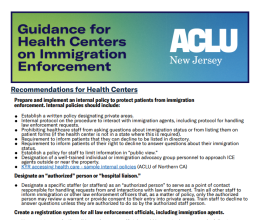
An ordinance to be introduced at the Oct. 23 Essex County Board of Chosen Freeholders meeting, based in part on recommendations by the ACLU-NJ, would begin paving the way for meaningful civilian oversight over Essex County Correctional Facility (ECCF). The ordinance, as announced by the Essex County Board of Chosen Freeholders and the Office of the Essex County Executive, would be a check on one of New Jersey’s largest jails, which also has one of the largest populations of immigration detainees among county jails nationwide.
The ACLU-NJ and fellow advocates will continue to push for transparency, an inclusive nomination process, and implementation that affirmatively engages important stakeholders: people detained in the jail, groups focused on the rights of incarcerated people, and residents of the Essex County community.
The proposed civilian review panel would fulfill a mandate to receive complaints about conditions at the jail, investigate abuses, talk to witnesses, make visits to the jail with one hour’s notice, and issue recommendations concerning all aspects of Essex County Correctional Facility. The oversight panel’s purview would encompass all people held there, including defendants awaiting trial, defendants who have been sentenced, and immigration detainees.
The ordinance follows accounts of egregious abuses and calls from Essex County residents for accountability and community oversight. Earlier this year, the U.S. Department of Homeland Security’s Office of the Inspector General released two scathing reports about conditions at the jail.
“The disturbing accounts coming out of Essex County Jail have led to one conclusion: that ongoing, independent oversight is urgent,” said ACLU-NJ Executive Director Amol Sinha. “Whenever the government incarcerates people in the community’s name, members of the public have an obligation to ensure that people’s rights are protected and that conditions in the jail are safe and humane. Although the proposed ordinance does not contain all the features required for true accountability, it provides a critical step forward.”
Most recently, in September, an immigration detainee reported being beaten and sexually assaulted by guards at the jail. Over the summer, another immigration detainee reported that in May two guards had assaulted and raped him, according to reporting from WNYC. ICE improperly deported the assaulted man in August before an investigation could be completed.
The reports from the Inspector General’s Office of the Department of Homeland Security detailed unsanitary and unsafe conditions found during unannounced visits. The reports described violations of rules limiting solitary confinement of detainees, who are held based on civil violations. Inspectors also found egregious food handling practices, including blood leaking from open boxes of raw chicken and garbage bags full of moldy bread saved to make bread pudding.
With authority to hold public meetings, to make visits to the jail with one hour’s notice, and to speak to people who work there and people who are held there, the task force would have the potential to carry out thorough, independent investigations of the jail, separate from internal investigations and disciplinary decisions. Following the completion of an investigation, the task force can publicly release its report of conclusions and recommendations.
“The freeholders and county executive have an opportunity to demonstrate a model of civilian oversight and we look forward to working with them and community advocates to implement these reforms,” said ACLU-NJ Senior Staff Attorney Farrin Anello. “With so few external checks on jails and immigration detention, it is critical to establish meaningful community oversight at Essex County Jail. If properly implemented, this oversight board could set an important example for the rest of New Jersey, along with the rest of the country.”



